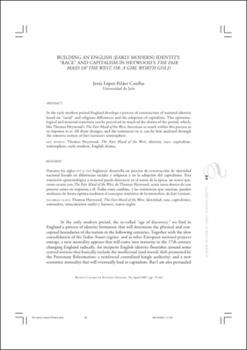Building an English (Early Modern) Identity:" Race" and Capitalism in Heywood's The Fair Maid of the West, or, A Girl Worth Gold
Fecha
2007Resumen
Durante los siglos XVI y XVII Inglaterra desarrolla un proceso de construcción de identidad nacional basado en diferencias raciales y religiosas y en la adopción del capitalismo. Esta transición epistemológica y material puede detectarse en el teatro de la época, un teatro que, como ocurre con The Fair Maid of the West, de Thomas Heywood, actúa tanto dentro de este proceso como en respuesta a él. Todos estos cambios, y las resistencias que suscitan, pueden analizarse de forma óptima mediante el concepto semiótico de la semiosfera, de Juri Lotman. In the early modern period England develops a process of construction of national identity
based on “racial” and religious differences and the adoption of capitalism. This epistemological and material transition can be perceived in much of the drama of the period, which,
like Thomas Heywood’s The Fair Maid of the West, functions as much within this process as
in response to it. All these changes, and the resistances to it, can be best analyzed through
the semiotic notion of Juri Lotman’s semiosphere.





